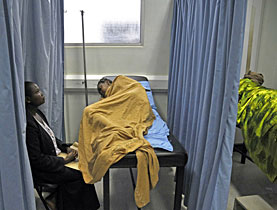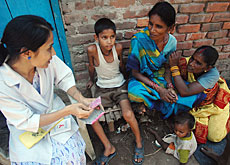UN Aids targets “will not be met”

Progress in the fight against HIV/Aids is being made but targets for 2010 set in 2001 will not be reached, according to the director of the Federal Health Office.
Thomas Zeltner, who was attending a high-level meeting on Aids at the United Nations General Assembly in New York, told swissinfo on Wednesday that more work also needs to be done regarding prevention.
UN Secretary-General Ban Ki-moon, heads of state and more than 80 ministers, senior officials, representatives of international organisations and civil society reviewed progress towards the targets agreed in the UN’s 2001 Declaration of Commitment on HIV/Aids and the 2006 Political Declaration on HIV/Aids.
The UNAids targets include reducing HIV prevalence among young men and women by 25 per cent globally by 2010.
Discussions at the two-day meeting, which finished on Wednesday night, also covered the remaining challenges and explored sustainable ways of overcoming them.
Ban Ki-moon presented his report on the global response to Aids. The report is based on 147 national progress reports submitted to UNAids, the United Nations’ Aids programme, at the end of January 2008.
swissinfo: What have been the main topics discussed in New York?
Thomas Zeltner: We have made substantial progress on a couple of the goals from 2001 but it is clear today that the goals for the period 2001-2010 will not be reached. We should probably keep the goals but set new dates.
swissinfo: Why will the goals not be reached?
T.Z.: First of all there is still a lack of financing and of resources. Secondly, the infrastructures in many countries were probably not ready.
Also the basic demand of the programme, namely that every country should have a national plan, a national structure and a system to monitor progress, has still not been established. As long as you don’t have these basic infrastructures, you aren’t really able to do the work in the country.
swissinfo: The UN says that despite increased global efforts against Aids, the number of people newly infected with HIV is easily outpacing those beginning antiretroviral drug treatments. Is progress being made?
T.Z.: Yes, there is no doubt. As the secretary-general explained in his report, one-third of all people living with HIV/Aids who could opt for a treatment programme are now in a treatment programme – that is a major step forward. Secondly, mother-to-child transmission has been substantially reduced in many countries.
Where we think things are lacking or not progressing as much as they should is in the area of prevention.
swissinfo: To what extent is fighting Aids a scientific problem – actually creating the medicine – and to what extent is it a political problem, getting the medicine to those who need it?
T.Z.: It is both. One point in the epidemic right now is that more women are newly infected than men, so that is of course a question of gender equality. And we all hope that at one stage there will be a vaccination. That is a medical problem and it is still not solved.
What is now on the agenda is a gel for women that kills the virus – that is a very interesting new option and could potentially be a major breakthrough in the heterosexual community.
swissinfo: The rise in the price of oil and food – not to mention the effects of climate change – have consequences for people suffering from Aids. How high up the list of UN and government priorities is Aids?
T.Z.: We see and feel that HIV/Aids no longer has the priority in many countries that it had five or ten years ago – and that’s true for developing but also donor countries. That has to do with other crises coming up.
Peter Piot [executive director of UNAids, who is stepping down after 13 years] put it very nicely yesterday when he said the Aids epidemic was a health crisis. It still is to some extent a health crisis but in parallel it’s becoming a chronic disease which needs investment for the next 30-40 years.
swissinfo: What is Switzerland’s contribution to the debate in New York and to the fight against Aids in general?
T.Z.: Our contributions are not so much financial but we are on the boards of UNAids and the Fund [the Global Fund to Fight Aids, Tuberculosis and Malaria]. We think it is very important to be there and to set the priorities in these two institutions.
Switzerland has been very active in the area of intellectual property rights and access to medicine. In May we brought the two interests together in Geneva and there I think real progress has been made.
swissinfo-interview: Thomas Stephens
Some 2.1 million people died of Aids last year and at least 33 million people worldwide have the virus, according to UN figures.
2.5 million people became infected with HIV last year compared with one million who started using important antiretroviral drugs.
In addition, people with weakened immune systems from HIV are up to 50 times more likely to develop tuberculosis, say UN officials.
The UN-backed Global Fund to Fight Aids, Tuberculosis and Malaria announced on Monday it had helped a total of 1.75 million people get antiretroviral treatment, an increase of 59 per cent over last year.
But slightly more than two-thirds of people with HIV globally are not getting any such treatment, according to UN figures.
To reduce by 2005 HIV prevalence among young men and women aged 15 to 24 in the most affected countries by 25 per cent and by 25 per cent globally by 2010.
By 2005, ensure that at least 90 per cent, and by 2010 at least 95 per cent, of young men and women aged 15 to 24 have access to the information, education, including peer education and youth-specific HIV education, and services necessary to develop the life skills required to reduce their vulnerability to HIV infection, in full partnership with young persons, parents, families, educators and health-care providers.
By 2005, reduce the proportion of infants infected with HIV by 20 per cent, and by 50 per cent by 2010, by ensuring that 80 per cent of pregnant women accessing antenatal care have information, counselling and other HIV-prevention services available to them.

In compliance with the JTI standards
More: SWI swissinfo.ch certified by the Journalism Trust Initiative



You can find an overview of ongoing debates with our journalists here. Please join us!
If you want to start a conversation about a topic raised in this article or want to report factual errors, email us at english@swissinfo.ch.